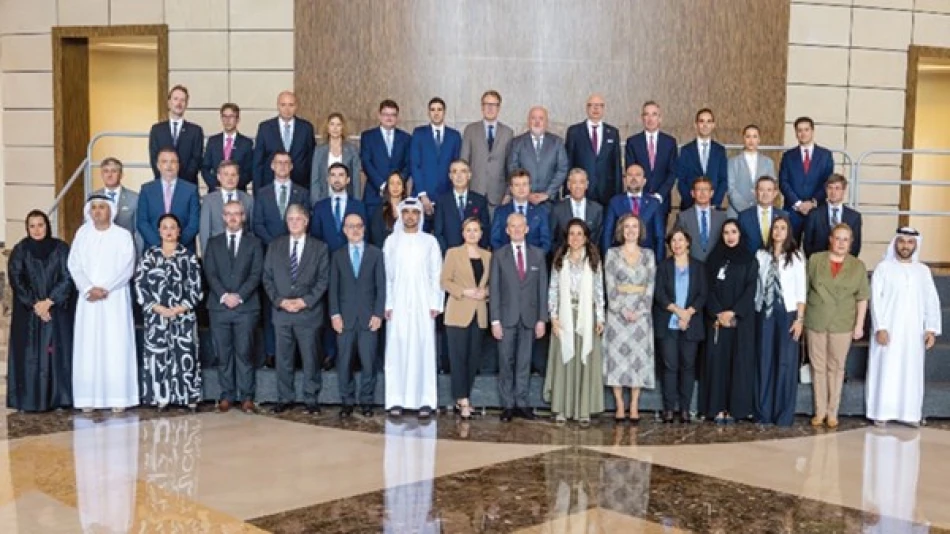
UAE Affirms Palestine's Future as Key to Lasting Peace
UAE Pushes Europe on Palestine Recognition While Strengthening Economic Ties
The United Arab Emirates is intensifying diplomatic efforts to align European partners with Middle Eastern priorities, particularly Palestinian statehood recognition, while simultaneously accelerating trade negotiations that could reshape economic relations between the Gulf and Europe. In a strategic meeting with European ambassadors, UAE Minister of State Lana Nusseibeh outlined a comprehensive regional agenda that positions the Emirates as both a mediator and economic bridge.
Two-State Solution Takes Center Stage
Nusseibeh welcomed European support for the joint Saudi-French initiative to expand recognition of Palestinian statehood, emphasizing that "Palestine's future remains the fundamental pillar for establishing sustainable peace in the Middle East." This diplomatic push comes at a critical juncture when international consensus on Middle East policy appears increasingly fragmented.
The minister praised the overwhelming majority that supported the New York Declaration at the UN General Assembly, noting Europe's near-unanimous backing for a resolution that reinforces the two-state solution while calling for Hamas's exclusion from Gaza governance arrangements. This position reflects the UAE's pragmatic approach to Palestinian statehood—supporting independence while rejecting extremist control.
Abraham Accords Under Pressure
Marking the fifth anniversary of the Abraham Accords, Nusseibeh issued a pointed warning about extremist policies that could undermine the normalization framework. This represents a delicate balancing act for the UAE, which seeks to maintain its groundbreaking diplomatic relationship with Israel while positioning itself as a champion of Palestinian rights—a stance that resonates strongly with European sensibilities.
Regional Mediation Efforts Expand
The UAE continues to leverage its diplomatic capital across multiple regional conflicts. On Sudan, the Emirates joined Saudi Arabia, Egypt, and the United States in supporting an immediate ceasefire and transition to civilian governance. This multilateral approach demonstrates how the UAE has evolved from a regional player to a global diplomatic facilitator.
Perhaps most notably, the UAE has facilitated the exchange of over 4,600 prisoners of war between Russia and Ukraine—a remarkable achievement that underscores the Emirates' unique position as a neutral mediator in conflicts where traditional Western diplomacy faces limitations.
Economic Diplomacy as Strategic Priority
Beyond regional politics, Nusseibeh emphasized the critical importance of free trade between the UAE and European Union, highlighting ongoing negotiations for a comprehensive economic partnership agreement. This economic dimension reveals the UAE's broader strategy: using trade relationships to strengthen political influence and create mutual dependencies that enhance diplomatic leverage.
Market Implications and Investment Outlook
The push for accelerated trade talks signals significant opportunities for investors and businesses. A UAE-EU comprehensive economic partnership could unlock substantial market access for European companies seeking Gulf expansion, while providing Emirati businesses with enhanced European market penetration. The minister's call for European countries to generate "necessary political momentum" suggests these negotiations have reached a critical phase where political will, rather than technical details, will determine success.
This economic integration strategy mirrors successful models implemented by Singapore and Switzerland, where small nations leverage trade relationships to amplify diplomatic influence far beyond their geographic size.
Strategic Positioning for Global Influence
The UAE's approach reflects a sophisticated understanding of contemporary geopolitics, where economic interdependence creates diplomatic opportunities. By simultaneously advocating for Palestinian statehood recognition and deeper European trade integration, the Emirates positions itself as an indispensable bridge between Western interests and Middle Eastern realities.
This dual-track diplomacy—combining principled positions on regional conflicts with pragmatic economic partnerships—represents a template that other Gulf states may emulate as they seek to diversify their international relationships beyond traditional security arrangements with the United States.
Most Viewed News

 Layla Al Mansoori
Layla Al Mansoori






